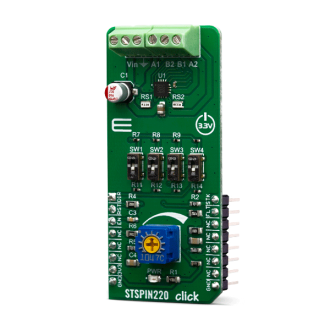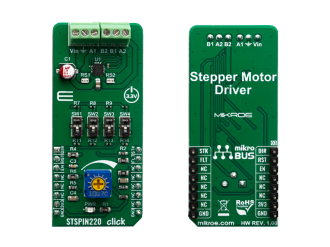
We strongly encourage users to use Package manager for sharing their code on Libstock website, because it boosts your efficiency and leaves the end user with no room for error. [more info]

Rating:
Author: MIKROE
Last Updated: 2019-05-06
Package Version: 1.0.0.0
mikroSDK Library: 1.0.0.0
Category: Stepper
Downloaded: 4951 times
Not followed.
License: MIT license
STSPIN220 click is a stepper motor driver with the PWM current control and selectable microstepping up to 256 microsteps. It is based on the STSPIN220, a low voltage stepper motor driver from STSPIN2 series.
Do you want to subscribe in order to receive notifications regarding "STSPIN220 click" changes.
Do you want to unsubscribe in order to stop receiving notifications regarding "STSPIN220 click" changes.
Do you want to report abuse regarding "STSPIN220 click".


Library Description
Library carries everything needed for stepper motor control including speed and acceleration setup. Library is also adjustable to working on different amount of ticks per second, also speed and acceleration can be provided in float format. Buffer used for movement calculation is defined by user so this library can be adjusted for MCUs with very limited RAM resources. Check documentation for more details how to use it.
Key functions:
Examples description
The application is composed of the three sections :
void applicationTask()
{
stspin220_start( (T_STSPIN220_OBJ)&myStepper );
while ( myStepper.status.running )
{
stspin220_process( (T_STSPIN220_OBJ)&myStepper );
}
Delay_ms( 2000 );
stspin220_start( (T_STSPIN220_OBJ)&myStepper );
Delay_ms( 1000 );
stspin220_stop( (T_STSPIN220_OBJ)&myStepper );
Delay_ms( 2000 );
}
In addition to library function calls example carries necessay Timer ISR and Timer initialization. Check Timer initialization setings and update it according to your MCU - Timer Calculator.
Additional notes and informations
Depending on the development board you are using, you may need USB UART click, USB UART 2 click or RS232 click to connect to your PC, for development systems with no UART to USB interface available on the board. The terminal available in all MikroElektronika compilers, or any other terminal application of your choice, can be used to read the message.